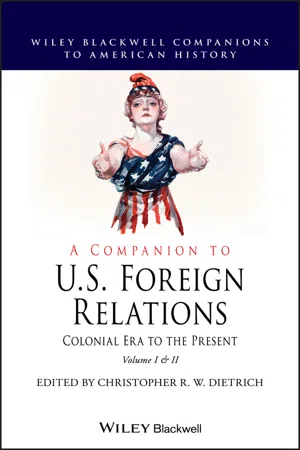History
US Involvement in WW2
The US involvement in WW2 began after the attack on Pearl Harbor in 1941, leading to the country's entry into the war. The US played a significant role in the Allied victory, contributing troops, resources, and military support to the war effort in Europe, Africa, and the Pacific. This involvement ultimately helped to shift the balance of power in favor of the Allies.
Written by Perlego with AI-assistance
Related key terms
1 Key excerpts on "US Involvement in WW2"
- eBook - ePub
A Companion to U.S. Foreign Relations
Colonial Era to the Present
- Christopher R. W. Dietrich(Author)
- 2020(Publication Date)
- Wiley-Blackwell(Publisher)
Chapter Twenty U.S. Foreign Relations During World War IIAndrew JohnstoneThe historiography of U.S. foreign relations during World War II is vast. For the United States, the war was one of the defining events of the twentieth century, altering its place and role in the world ever since. Given the significant changes that came with it, the war continues to attract public interest. This is in no small part because of the perception of it as a “good war” against evil, and the fact it is still in living memory. Scholarly interest has been further supported over the years by a huge amount of available source material in the form of documents and memoirs. And while most of that material may now be openly available, historians continue to revisit previously examined events and to use different approaches to assess seemingly well‐known historical issues. Historians have also found new ways of examining sources, events, and actors that might once have been deemed tangential or even irrelevant. As a result, the literature continues to grow, and even if the surge of interest that followed the 50th and 60th anniversaries of the war's end has passed, it shows no sign of stopping soon.1The writing of history is always affected by the era in which it is written, and that has certainly been the case with World War II. Much of the early literature on the war was deeply entwined with the debates over the origins of the Cold War, and there is no question that many later books and articles reflect the political climate in which they were produced. In the decades since the end of the Cold War, those heated political debates have started to fade, though they have not vanished completely. As Mark Stoler (2014 ) has pointed out, while World War II and the Cold War are still linked, the former is increasingly seen on its own terms. It is not, as was once feared by Warren F. Kimball (2001
Learn about this page
Index pages curate the most relevant extracts from our library of academic textbooks. They’ve been created using an in-house natural language model (NLM), each adding context and meaning to key research topics.
